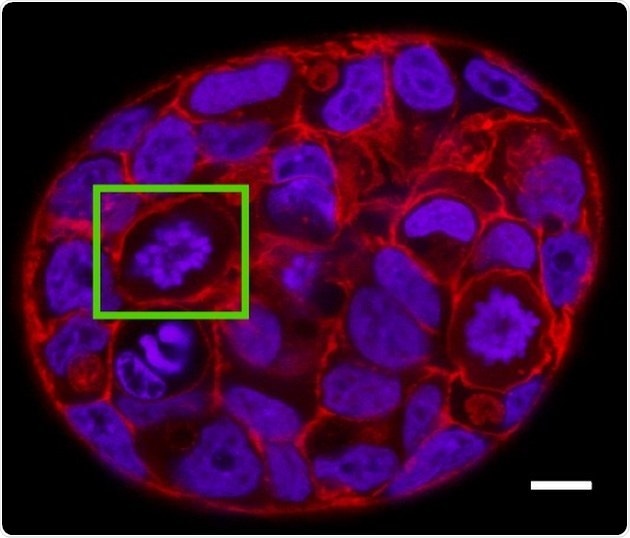A majority of the animal cells must become spherical to undergo cell division. These cells achieve this spherical shape by rounding up and deforming their neighboring cells.

A mini-tumor of human breast epithelial cells (MCF-7). A dividing cell indicated in green. Image Credit: © Dr Elisabeth Fischer-Friedrich.
The tumor cells in a growing tumor tissue should divide in a setting that is turning out to be more crowded when compared to the healthy tissue.
This implies that the dividing cancer cells would possibly need to create relatively higher mechanical forces to round up in this closely packed environment. Nevertheless, tumor cells appear to be adapted to overcome such problems.
A team of researchers, headed by Dr Elisabeth Fischer-Friedrich, wanted to know how this improved ability is gained by the tumor cells to tackle the crowded tumor surrounding.
The team discovered that one of the answers may lie in the epithelial-mesenchymal transition (EMT). But what exactly is this EMT?
EMT or epithelial-mesenchymal transition is a hallmark of cancer progression.”
Kamran Hosseini, Study Author and PhD Student, Technische Universität Dresden
Hosseini also conducted the experiments.
EMT is a cell transformation that causes tumor cells to lose their asymmetric organization and separate from their neighbors, and this allows the tumor cells to acquire the ability to move into other tissues. This, along with other factors, also enables tumors to metastasize, that is move into the lymphatic and blood vessels and finally colonize other organs.
So far, EMT has been mainly linked to this enhanced cell dissociation and cell migration. Our results suggest that EMT might also influence cancer cells by promoting successful rounding and cell division. These results point towards a completely new direction of how EMT could promote metastasis of carcinoma in the body.”
Kamran Hosseini, Study Author, Dresden University of Technology
Similar to how the ripeness of fruits is tested by squeezing them mildly with hands, the researchers investigated the mechanical characteristics of individual human cells. But in this case, they used an atomic force microscope to squish the cells. This advanced setup quantified characteristics, like cell surface tension and cell stiffness, both before and after the EMT.
In association with Dr Anna Taubenberger (BIOTEC, Dresden University of Technology) and Professor Carsten Werner from (IPF, Dresden), the team of Dr Elisabeth Fischer-Friedrich also cultured mini-tumors and captured them inside elastic hydrogels to verify how mechanical confinement has an impact on the cell rounding and division of cancer cells.
The study authors detected modifications in the rounding and growth of the tumor cells. EMT affected the cancer cells in two opposing ways. While the surrounding non-dividing cells became softer, the dividing tumor cells turned out to be stiffer.
Additionally, the team identified clues that the mechanical changes, thus observed, could be associated with the enhanced activity of a protein known as Rac1, a familiar regulator of the cytoskeleton.
Our findings will not only provide important results to the field of cell biology but may also identify new targets for cancer therapeutics.”
Dr Elisabeth Fischer-Friedrich, Study Author, Dresden University of Technology
Source:
Journal reference:
Hosseini, K., et al. (2020) EMT-Induced Cell-Mechanical Changes Enhance Mitotic Rounding Strength. Advanced Science. doi.org/10.1002/advs.202001276.